Manno: College Is More Than a Wage Premium — It’s a Road to Well-being and a Satisfying Life
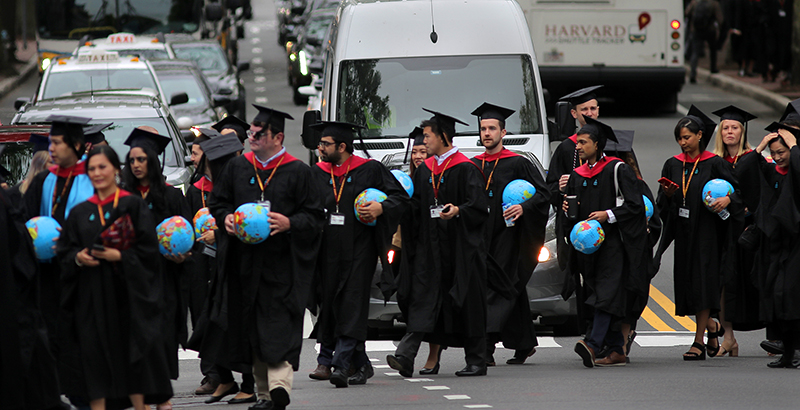
What do individuals gain from a college degree? And what does society gain from this investment?
Studies demonstrate what common sense suspects: college graduates with bachelor’s — or advanced — degrees earn more money over a lifetime than non-college graduates. National Bureau of Economic Research analysts show that since at least 1890, this “college earnings premium” has narrowed, slowed, or varied by degree, type, race, gender and ethnicity, but it has never disappeared.
But focusing on this wage premium overshadows other advantages a college degree brings for individual well-being and other positive life outcomes. These advantages often accrue to society and the children of college graduates who enjoy childhood benefits and better long-term outcomes.
The College Board’s Education Pays 2016 documents many of these outcomes. A college degree is associated with a healthier lifestyle, including less smoking, more exercise and less obesity. College graduates are more likely to participate in civic life, including unpaid volunteering and voting.
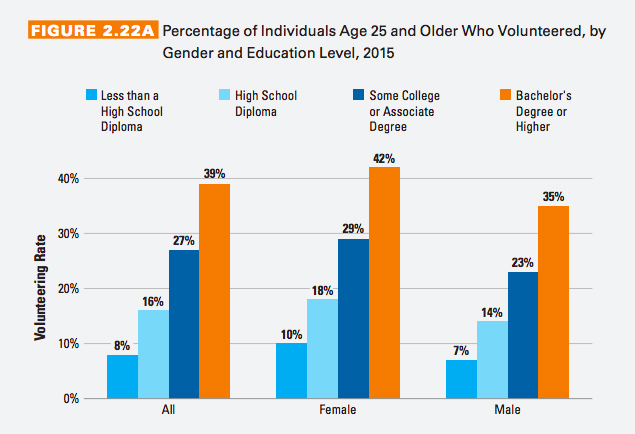
Children of college graduates are more likely to engage in educational activities with family members, including reading and visiting a library, art gallery, museum or historical site. These children tend to be healthier — childhood obesity rates are more than twice as high among children of high school dropouts as children of parents with a bachelor’s degree or higher.
The Lumina Foundation produced an analysis of college’s benefits for graduates ages 27 through 66. When compared with high school graduates, those with a degree had lower incidences of poverty and unemployment, a higher likelihood of having health insurance and retirement plan, and a longer life expectancy. The Commission to Build a Heathier America reports that on average, college graduates live at least five years longer than those who did not complete high school.
Societal benefits include higher annual cash donations to charities; higher volunteer rates and participation rates in community meetings with civic, service and religious organizations; lower incidents of criminal behavior; additional tax revenue; fewer participants receiving means-tested public assistance and social insurance like unemployment compensation; and greater social capital, including more frequent speaking and exchanging favors with neighbors.
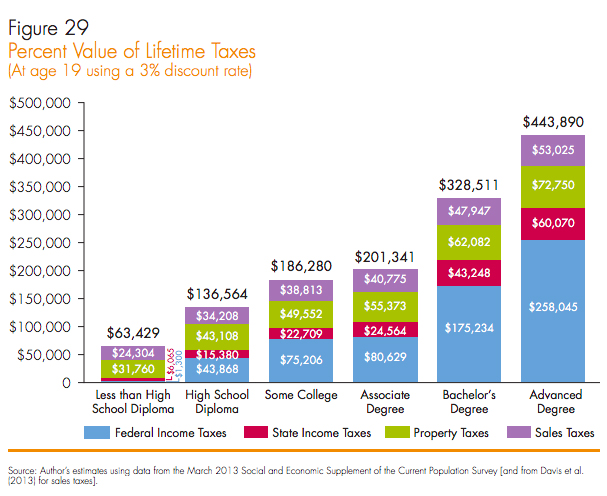
Caution is in order not to infer a causal link between degree attainment and these outcomes. In other words, these outcomes are correlated with a college degree, not necessarily caused by it.
A study in the Journal of Health Economics, focusing on white men eligible to be drafted into the Vietnam War and between the ages of 38 and 49 by 1980, tackled the causality issue, being “…the first to provide a causal estimate of the effect of college completion on mortality.” The researchers found that “increasing college completion rates in the lowest-education birth state-cohort to that of the highest would reduce early cancer deaths by 25.9 per 1,000 … and early heart disease deaths by 18.9….”
Another source on well-being is the Gallup-Purdue University Index (now conducted by Gallup and Strada Education Network), a random sample of nearly 30,000 college graduates. It examines the relationship between the college experience and graduates’ lives, including workforce engagement and a good job as well as individual well-being and a good life.
There are five interrelated elements of well-being merging clinical research, health leadership and behavioral economics shown to have the greatest impact on individual well-being. These factors are purpose — liking what one does and being motivated to achieve goals; social — having supportive relationships and love in life; financial — managing one’s economic life to reduce stress and increase security; community — liking where one lives, feeling safe and having pride in one’s community; and physical — being in good health and having enough energy to get things done.
Gallup records that people’s evaluation of their own well-being increases with education, so college graduates gave themselves the highest ratings. Fifty-four percent of graduates are flourishing in purpose well-being; 49 percent in social well-being; 47 percent in community well-being; 42 percent in financial well-being; and 35 percent in physical well-being. Well-being is higher across all five elements for older graduates.
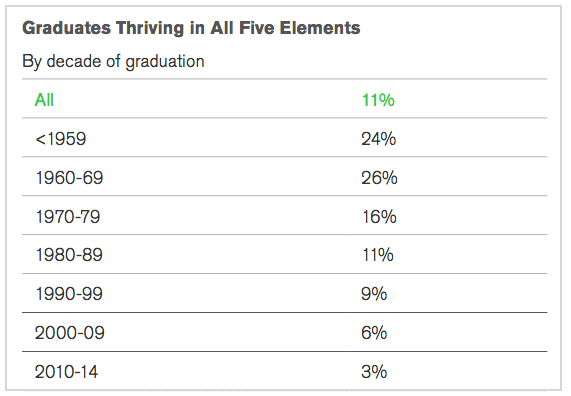
The school type from which an individual graduates — public, private, size, degrees granted, etc. — is not related to well-being, though fewer for-profit institution graduates thrive in well-being in all five areas. The higher student loan debt, the worse the well-being rating.
Finally, higher well-being is related to the student’s experience on campus, with 17 percent of graduates who feel supported in college prospering in all five areas of well-being, compared with 6 percent who did not feel supported. The support experience includes having professors who cared for them, made them excited about learning and were mentors to them. And graduates who engaged in learning are more likely to thrive in all areas of well-being, with this manifesting itself in student participation in paid internships and extracurricular activities and completing a long-range project.
Nobel Prize winners Daniel Kahneman and Angus Deaton investigate income and well-being from another perspective. They differentiate two aspects of happiness — our experiencing selves and our remembering selves — that gauge a different dimension of well-being. Emotional well-being is our experiencing selves and the frequency and intensity of the emotional qualities of everyday life related to experiences like affection, joy and sadness. Our experiencing selves make life pleasant or unpleasant. On the other hand, life evaluation — our remembering selves — has a longer time frame. It describes our thoughts about our own lives from broader perspective as we compare ourselves to others or as we achieve goals and meet expectations.
Kahneman and Deaton asked “whether money buys happiness, separately for these two aspects of well-being.” To measure this, they analyzed Gallup and the Healthways Corporation’s daily surveys of more than 1,000 randomly selected individuals across 2008 and 2009, yielding more than 450,000 responses. Emotional well-being was assessed by asking individuals how much time they had spent in positive and negative emotional states the previous day. Life evaluation was measured by asking individuals to rate their lives on a ladder scale of zero to 10.
On average, life evaluations rise with household income while emotional well-being leveled off at approximately $75,000 (the amount varies by geography and other factors). In short, “Above a certain income level, people’s emotional well-being is constrained by other factors, such as temperament and life circumstances. In other words, being divorced, being sick, and other painful experiences have worse effects on a poor person than on a rich [person].” In their analysis, college graduates are more likely to have higher life evaluations but not necessarily better emotional well-being.
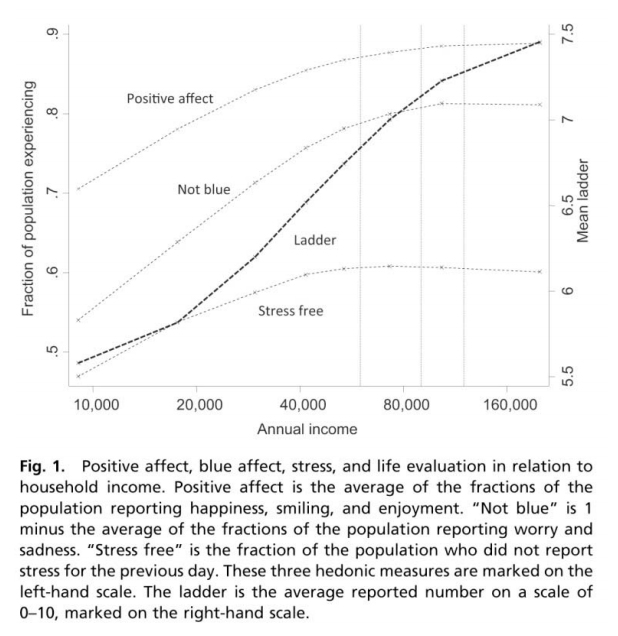
What to make of this?
A college degree produces a wage premium — and much more associated with significant benefits for individuals, children and society. In addition, Kahneman and Deaton suggest that the higher income associated with a degree does bring individuals a life they think is better. But the emotional well-being of daily life has a point of “income satiation” — it levels off at an income point. As they say, “…lack of money brings both emotional misery and low life evaluation [while] higher income continues to improve individuals’ life evaluation.”
Bruno Manno is a senior adviser for the K-12 Program at the Walton Family Foundation.
Disclosure: The Walton Family Foundation provides financial support to The 74.
Get stories like these delivered straight to your inbox. Sign up for The 74 Newsletter

;)
